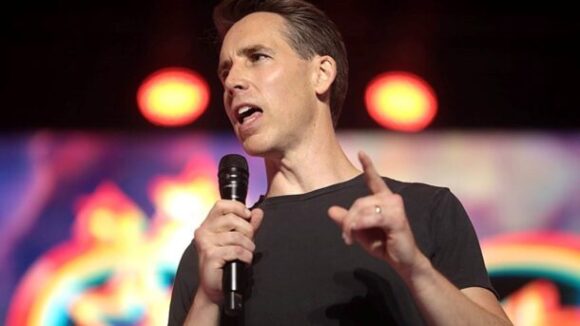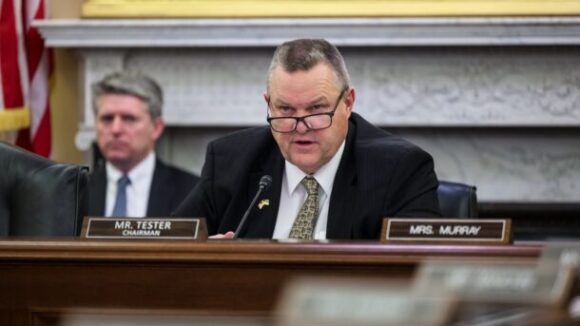GOP’s ‘Dangerous Liaison’ With Union Bigwigs
Josh Hawley distances himself from pro-Right to Work pledges, aligning with union bosses like the Teamsters, despite their history of corruption.
The recent Democrat presidential debate in Chicago left an obvious impression in the mind of one astute political columnist, Al Knight, of the Denver Post — “Democrats Love Unions, and Unions Love Democrats:”
The AFL-CIO summer meeting is underway in Chicago and the nation’s labor leaders have much to celebrate. The Democratic presidential candidates were scheduled to again grovel before organized labor last night and doubtless promise to heed the labor agenda, which includes the creation of a universal health care system.
After all, whenever Democrats meet with organized labor leaders, it is a love fest. Indeed, the love fest has been a central feature of this year’s congressional session. Few things have been more important to Democrats that pleasing organized labor.
Labor organizations want the public to believe that they produced the Democratic victories of last year and are thus entitled to the fruits of the effort. In fact, the election outcome was most likely traceable to other issues, like the Iraq war and Democratic charges that the Republican Congress was corrupt.
Whatever the reason for the victory, the Democrats just can’t do enough for the labor unions.
The House passed the misnamed Employee Free Choice Act, which would have eliminated the secret ballot for workers voting on whether to form a labor union. The measure fell just nine votes short of Senate approval, but organized labor still has its passage at the top of its wish list.
Democrats have been working hard in two other areas to satisfy their friends in labor. The first is to cut the operating budget of the Office of Labor-Management Standards, the main government agency that monitors the financial integrity of labor unions. Labor union leaders have complained that the paperwork imposed by the government is a burden, even though less than 5 percent of the nation’s 15,800 unions are audited in any one year.
It should be big news when Democrats locate a program they want to cut, but the budget reductions proposed for the labor agency have attracted little mainstream media attention. Under the Democratic proposal, the budget for the agency would revert to 2006 levels next year despite the fact that the overall Labor, Health and Human Services budget would be $11 billion more than the president has requested.
Unsurprisingly, the Bush administration opposes the overall bill, in part because the changes in union oversight “weaken the agency’s ability to improve union transparency and strengthen financial integrity.”
The second congressional gift to organized labor is the expansion of the Davis-Bacon Act, a Depression-era measure intended to assure that contract workers paid by the federal government earned the prevailing or average local wage.
For a number of reasons, including the way wage surveys are conducted, the Bacon-Davis term of “prevailing wage” has come to mean the “union wage.” Put another way, labor organizations have used the Davis-Bacon provisions to assure that any federal contract pays as close to union wage as possible.
Why is this a problem? It amounts to a federal requirement to artificially increase the price of all affected federal contracts, whether for bridges, subsidized housing or flood control. And it usurps local and state decision-making that otherwise might use the labor market to obtain lower construction costs.
In recent weeks, Congress voted to mandate the Davis-Bacon provisions to the construction of new nuclear power plants, to the construction of ethanol and other bio-fuel projects, to railroad track construction, the development of solar reserves on federal lands, and to any construction funded by the clean water state revolving fund. This fund is used by cities and towns to make repairs and improvements to wastewater treatment plants. The Davis-Bacon provisions will apply not just to federal dollars but to those contributed by the states and localities.
Colorado voters should be concerned about the gifts bestowed on organized labor. The state’s unionized workforce is relatively tiny, just 7.7 percent overall, much of that in the public sector. The national average is just 12 percent. More importantly, even though construction unionism in the Denver metro area is just 6.8 percent, the Davis-Bacon wages are, in fact, union wages.
Given this relationship between elected Democrats and organized labor, it is easy to see why both groups love Davis-Bacon. It is hard to see why any sane taxpayer should.

Josh Hawley distances himself from pro-Right to Work pledges, aligning with union bosses like the Teamsters, despite their history of corruption.

IGUA union officials provided contradictory information on amount a Master Security guard must pay the union to keep a job

Thanks to the Committee's election-year program, union-label candidates like Sen. Jon Tester (Mont.) are being given a choice: pledge to change course and support Right to Work going forward, or face the potential political consequences.